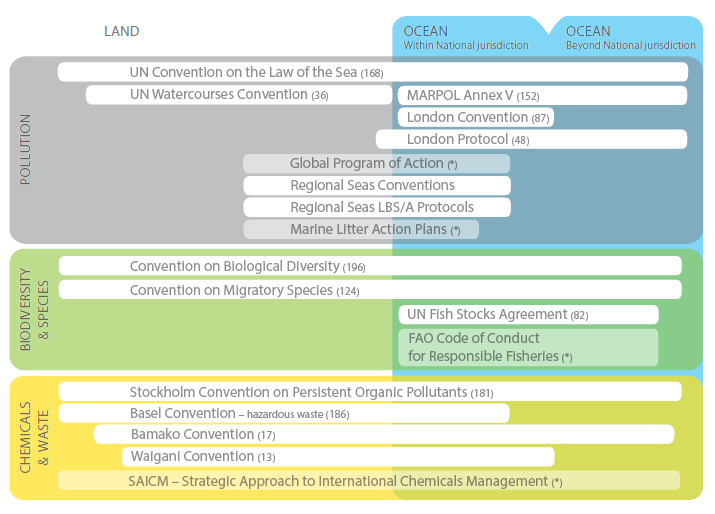New Potential Treaty on Marine Litter and Microplastics: What You Need to Know
Client Alert | 13 min read | 11.20.20
Support is growing rapidly for a new global agreement on marine litter and microplastics. A UN working group met at a virtual conference November 8 – 13 to discuss the issue. At that meeting a vast majority of UN member states including the EU and its member states; the Nordic Council, the Africa Group and its member states, Costa Rica, the Philippines, Peru, Vietnam, Switzerland, Sri Lanka, and the small island states all voiced their support for the development of a new agreement.
The new potential treaty has been compared to the Paris climate agreement or the Montreal protocol to prevent ozone depletion. Advocates for a new treaty argue that the current existing international legal framework governing plastic pollution (shown below) is fragmented and ineffective.
Figure 1: Diagrammatic overview of relevant global and regional instruments addressing plastic pollution

* designates voluntary instrument. Numbers in parentheses indicate ratifications/accessions. Adapted from a UN Environment publication.
A range of new provisions have been proposed for the new treaty including: 1) global and national reduction targets; 2) global design standards; 3) phasing out avoidable plastic products; and 4) mandates for national action plans.
How these broad objectives will be addressed in a potential new treaty is still unclear. For example, will reduction targets only apply to the discharge of litter into the environment or also to production and consumption of plastic? Will global design standards apply to only plastic packaging or other plastic products as well? What plastic products are considered avoidable and what should the proposed national action plans address?
A coalition of global brand name companies in the consumer product sector have also weighed in, signing a new manifesto calling on the UN to develop a treaty on plastic pollution. They call for the new treaty to harmonize regulatory standards, define common metrics, mandate national actions plans focused on eliminating discharge of plastic into the environment and provide support for new technologies and infrastructure to help drive the transition to a circular economy for plastic.
Some UN member states including the United States, Japan, and Canada are advocating for the need to strengthen existing agreements and use existing mechanisms such as the Asia-Pacific Economic Cooperation (APEC), the G20, the Ocean Plastics Charter, and the Global Partnership on Marine Litter (GPML).
APEC has emerged as a key forum for the private sector and governments in the Asia-Pacific region to discuss solutions to marine plastic pollution and specifically improving waste collection and management systems. APEC Ministers convened virtually on November 16 and in their annual statement welcomed work to support resource efficiency and explore ways to safely and innovatively manage waste and address marine debris. APEC Leaders met on November 20 and stressed the importance of new technology to allow economies to handle waste more sustainably.
New Zealand’s APEC host year in 2021 will provide an opportunity to engage on marine litter and circular economy policy issues with Asia-Pacific economies driving the policy debate. C&M International’s team of professionals in Washington D.C. and Singapore can help companies and organizations that would like to understand the implications of the rapidly evolving policy discussions regarding plastic pollution and how they can advocate for and advance meaningful partnerships to promote sustainability and sound environmental policy.
Insights
Client Alert | 2 min read | 11.14.24
SEC ESG Enforcement Is Still Alive
On November 8, 2024 the SEC announced a settled enforcement action against Invesco Advisers, Inc. for making misleading statements about its integration of environmental, social, and governance (ESG) factors into the firm’s investment decisions. Invesco agreed to pay a $17.5 million civil penalty to settle the matter. This enforcement action makes it clear that, even though the SEC dissolved its ESG Task Force, the Commission continues to monitor firms’ statements and representations for misleading statements about ESG.
Client Alert | 8 min read | 11.12.24
Client Alert | 3 min read | 11.11.24
Allegations of a Litany of Lyin’: Penn State Settles Claims of Cybersecurity Noncompliance
Client Alert | 1 min read | 11.08.24
A Common-Sense Change to the Continuous SAM Registration Requirement at FAR 52.204 7



